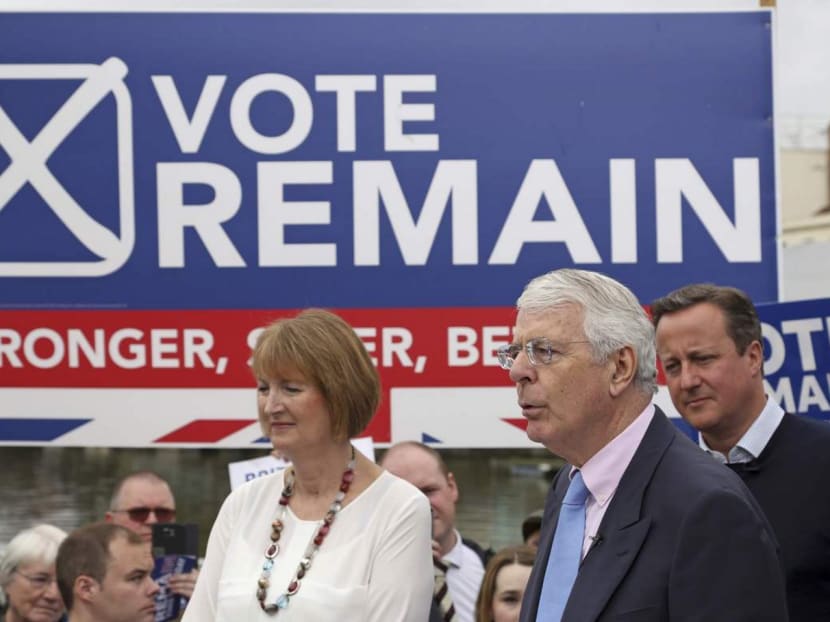Britain on a knife-edge as Brexit vote looms
LONDON — Prime Minister David Cameron and his Eurosceptic opponents made final pitches for wavering voters yesterday on the eve of a defining referendum on European Union membership, with the outcome going down to the wire.

British Prime Minister David Cameron (R) stands with Labour's Harriet Harman (L) as former Conservative Prime Minister John Major addresses pro-EU "Vote Remain" supporters during a rally in Bristol, Britain June 22, 2016. Photo: REUTERS
LONDON — Prime Minister David Cameron and his Eurosceptic opponents made final pitches for wavering voters yesterday on the eve of a defining referendum on European Union membership, with the outcome going down to the wire.
The vote today, which echoes the rise of populism in Europe and the United States, will shape the future of Europe. A victory for “out” could unleash turmoil on financial markets.
“It’s very close; nobody knows what’s going to happen,” Mr Cameron told yesterday’s Financial Times, with opinion polls showing the rival camps neck and neck.
He outlined his vision for a future with Britain retaining its place in the 28-nation bloc, bristling at the notion that the country would be headed in the wrong direction if it stayed in. He flatly rejected the charge that the institution is moribund. “We are not shackled to a corpse,’’ Mr Cameron told the BBC. “You can see the European economy’s recovery. It’s the largest single market in the world.’’
The most notable figure in the “Leave” campaign, former London mayor Boris Johnson, kicked off a whirlwind tour of England as he pushed for Brexit. Touring the Billingsgate Fish Market, Mr Johnson mugged for the cameras with fish in hand — a not-so-subtle reminder that this is an island nation, and one very proud of its independence and self-assurance.
“It’s time to have a totally new relationship with our friends and partners across the Channel,” said Mr Johnson. “It’s time to speak up for democracy, and hundreds of millions of people around Europe agree with us. It’s time to break away from the failing and dysfunctional EU system.”
Voters go to the polls a week after the murder of pro-EU lawmaker Jo Cox shocked the country, raising questions about the tone of an increasingly bitter campaign. Much of the debate has boiled down to two issues: Economy and immigration.
The City of London, the International Monetary Fund and the majority of British business leaders back Mr Cameron and his Remain camp’s stance that to leave the EU would plunge Britain into recession, costing jobs and raising prices. But those supporting Brexit have struck a chord with many voters by saying Britain would regain control of immigration if it cut itself loose from a bloc they regard as domineering and out of touch.
In one of the last debates early yesterday, London’s newly elected mayor, Mr Sadiq Khan, accused Mr Johnson of exploiting fears of immigration to stoke anti-EU opinions. “Your campaign hasn’t been ‘project fear’, it’s been ‘project hate’ as far as immigration is concerned,” said Mr Khan to huge applause from the 6,000 crowd at a live TV debate at London’s Wembley Arena.
Opinion polls have painted a contradictory picture of public opinion in a deeply divided nation. Some published since Cox’s murder suggested a slight lead for “Remain”, though often within the margin of error. A man accused of her murder gave his name as “Death to traitors, freedom for Britain” when he appeared in court on Saturday. Cox’s husband said on Tuesday his wife had been killed because of her strong political views.
World leaders including US President Barack Obama, Chinese President Xi Jinping, German Chancellor Angela Merkel and the Nato and Commonwealth allies have urged Britain to remain in the EU. Some have warned of the drawbacks of isolation. France’s government spokesman said yesterday that Britain would lose access to the EU’s prized single market.
The bosses of 51 of the FTSE 100 British companies, and 1,285 business leaders who together employ 1.75 million people, signed a joint letter to The Times yesterday urging voters to remain. “Britain leaving the EU would mean uncertainty for our firms, less trade with Europe and fewer jobs,” they said. “Britain remaining in the EU would mean the opposite: more certainty, more trade and more jobs.”
A vote to leave could unleash turmoil on foreign exchange, equity and bond markets, lead to a political crisis in Britain and fragment the post-Cold War European order.
The EU would have to weather the exit of its No 2 economy representing US$2.9 trillion (S$3.88 trillion) of its gross domestic product, the only European financial capital to rival New York and one of its only two nuclear powers, while Britain’s economy could stall.
Polling stations open at 0600 GMT today and close at 2100 GMT. The official result is due some time after 0600 GMT tomorrow, but partial results and turnout figures from 382 counting centres will be announced from about 0100 GMT tomorrow. AGENCIES






